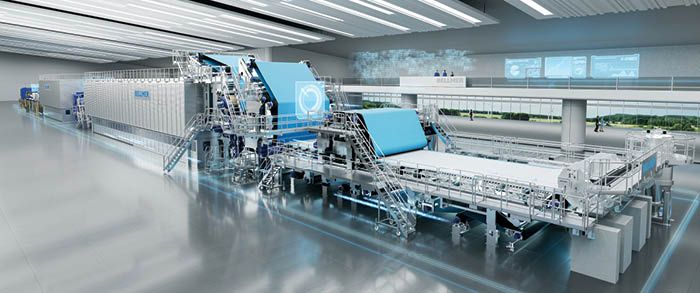Indian pulp and paper industry is witnessing a rise in indigenous technologies that offer tailored and affordable modernization solutions.

The Indian paper industry is undergoing a significant shift, fueled not by international innovation but by indigenous creativity. Indian paper mills, influenced by challenges like inconsistent resources, lack of water/energy, and price sensitivity, are using local tech for customized solutions. Indian engineering companies are creating affordable, strong, and versatile machines for all stages of production, ensuring mills operate well. Paper Mart captures the pulse of that grassroots innovation through the lens of key technology suppliers powering the industry from within.
Stock Prep and Pulping Technologies
Technologies for stock preparation, ranging from pulping, refining, cleaning, screening to de-inking, directly determine fiber yield and production costs in Indian paper mills. The technologies for these processes are especially important when mills use various raw materials, such as agricultural residue, hardwood, and recycled paper, each needing distinct handling.
Parason, a major provider in this segment, created specific equipment for diverse furnish needs, with capacities ranging from 25 TPD to 500 TPD. The company’s systems focus on energy-efficient operations, addressing the cost pressures mills face when processing different fiber sources.
“One of our latest advancements is the Tangential Refiner, an energy-efficient, modified TITO refiner designed with Indian mills in mind,” shared Shekhar Desarda, CMD of Parason. According to him, this innovation delivers up to 25% energy savings compared to conventional refiners, making it particularly attractive to mills focused on operational cost reductions without sacrificing performance.
JMC Paper Tech adopts a wider approach thanks to its wide-ranging services across the complete paper production value chain. From full turnkey paper machine projects to advanced stock preparation systems and integrated pulp mills tailored for agro-based and wood-based raw materials, JMC delivers end-to-end solutions designed for high-efficiency and sustainable production.
“At JMC Paper Tech, we are a leading force in the pulp and paper machinery sector, specializing in the end-to-end delivery of sophisticated systems on an EPC basis,” said Rajni Patel, CMD. JMC’s critical auxiliary equipment portfolio includes high-performance headboxes for uniform pulp distribution, energy-efficient press sections and steel dryers, and precision-engineered high-speed rewinders, each playing a vital role in improving machine performance and paper quality across kraft, board, tissue, and writing and printing paper segments.
Companies such as Servall Engineering and Amit Paper Consultants & Engineers are increasing their market share in the Indian paper tech market. They offer tailored pulpers, refiners, and screening systems for mills utilizing recycled or agricultural raw materials.
These companies prefer rugged, energy-saving designs to deal with variable supply quality, helping mills cut fiber waste, regulate freeness, and improve pulp purity. By doing so, they enable more reliable and cost-effective downstream operations across stock preparation and pulping lines.
Watch: In Pursuit of Lesser Water Footprint
Flow Control and Pumping Systems
Paper mills rely heavily on pumping and flow control systems, which quietly manage everything from pulp consistency to waste. Progressive cavity pumps and centrifugal slurry pumps serve this domain where viscosity, abrasiveness, and load variability are high.
Roto Pumps, a long-standing manufacturer of progressive cavity technology, offers a versatile lineup tailored for the pulp and paper industry, from low to high viscosity fluids, black liquor handling, to precise chemical dosing. Their wide throat pumps, now upgraded with extended hoppers and larger augers, are particularly suited for high-consistency pulp applications, helping mills save significant volumes of water compared to conventional centrifugal systems.
“Our progressive cavity pumps are inherently energy-efficient, offering low power absorption,” said Vinay Dhar, senior executive at Roto Pumps. The newly launched ‘P’ range features a compact thrust bush joint and convertible top-hat design, simplifying installation and conversion between configurations. With non-metallic dosing models for aggressive chemicals and customizable sealing and material options, Roto addresses cost and maintenance sensitivities of mid-sized mills without compromising performance.
Likewise, Abirami Pumps offers a wide range of industrial pumps designed for the pulp and paper industry, including pulp stock pumps for various consistencies, as well as specialized solutions for effluent treatment, chemical dosing, and coating processes. Designed for rugged Indian mill conditions, their pumps feature a heavy-duty triple bearing system and an impeller triple locking mechanism that safeguards against back pressure damage. They offer noise-free, maintenance-free performance with improved metallurgy and short delivery cycles.
“Our new-age, energy-efficient pumps are designed to ensure highly-efficient and productive operations across the industry,” said Guru Krishna, Chief Marketing Officer. With modular builds, retrofit compatibility, and support for remote monitoring readiness, Abirami caters especially to mid-sized mills seeking efficiency upgrades without full system overhauls.
Alongside Roto Pumps and Abirami Pumps, several other Indian firms have made significant inroads in the paper sector. Sam Turbo Industry Ltd., for example, has served leading paper mills like ITC, Trident, Khanna Paper, and TNPL since the 1980s, supplying medium-consistency pumps, fan pumps, and liquor-handling systems built with foam-pattern casting to improve hydraulic efficiency.
Keerthi Pumps India, with over two decades of experience, manufactures heavy-duty stock pumps, chemical process pumps, and dewatering systems, delivering flow rates up to 3,000 m³/hr with low life-cycle energy consumption and in-house foundry support.
Kakati Karshak Industries adds another dimension with its highly efficient liquid-ring vacuum pumps and vacuum systems used across sheet formation and dewatering stages in more than 600 Indian mills, offering significant power savings and dependable field service.
Risansi Industries, too, offers a wide range of centrifugal and non-clog pumps specially designed for pulp stock transfer, chemical dosing, and effluent handling, supported by pan-India servicing and rugged design tailored to Indian mill conditions.
Smart Controls for Traditional Mills
Process stability and energy efficiency in Indian mills depend more and more on automation and electrical control technologies. Automation specialists like Tycon Automation have contributed to modernizing brownfield mills through future-ready electrical and control systems. Their offerings include energy management solutions, low harmonic regenerative drive systems, and Distributed Control Systems (DCS) with minimal instrumentation, designed specifically for the cost and complexity constraints of Indian mills.
“We introduced a sectional drive system with Distributed Control System (DCS) with bare minimum instrumentation, 2.5 decades back, and the same system is the backbone of current system offering,” noted Rohit Tickoo, Director at Tycon. With a focus on internal efficiency, Tycon helps mills optimize energy use, adapt to variable raw material conditions, and prepare for AI integration.
Another homegrown player making strides is CN Automation LLP, which has emerged as a key EPC solution provider for automation in Indian paper mills. With capabilities ranging from PLC programming and SCADA integration to custom-built control panels, CN Automation caters specifically to the operational needs of small and mid-sized mills.
CN Automation’s projects emphasize modularity and retrofit compatibility, making them ideal partners for legacy mill upgrades where complete overhauls are impractical. By enabling smoother machine coordination, real-time monitoring, and energy-efficient operations, companies like CN Automation are instrumental in bridging the automation gap while preserving cost-effectiveness for domestic mills.
While companies like Tycon Automation and CN Automation are steadily advancing mill-level integration in cost-sensitive and legacy environments, the broader automation space in the Indian paper industry is still dominated by global giants such as ABB India, Siemens, Honeywell, and Yokogawa. These multinational players supply high-end systems for large-scale and greenfield operations.
However, the domestic automation ecosystem remains in an early growth phase, focused more on custom retrofits, energy optimization, and modular controls than on full-scale digital plant transformation. Indian automation tech scaling up hinges on more investment in local R&D, sensor tech, and service infrastructure.
Advancements in Press and Calendar Rolls
The precision of calendaring and pressing affects paper quality, including surface finish, GSM, and gloss, critical for premium printing. A number of homegrown manufacturers have carved a niche in this space. Zenith Rubber and Lathia Rubber produce industrial rollers with proprietary rubber formulations and enhanced surface properties for suction press, calendar, and coater applications.
Amar Elastomers specializes in polyurethane (PU) and composite rollers engineered for abrasion resistance and high-pressure operations, supporting mills shifting toward coated grades and recycled fiber. Modinagar Rolls, one of the country’s oldest precision roll manufacturers, supplies a broad spectrum of rubber and composite rolls with in-house grinding, balancing, and inspection capabilities that cater to high-speed modern machines.
Together, these domestic suppliers are helping Indian mills achieve smoother sheet profiles, reduced web breaks, and improved press section water removal, directly translating into higher productivity and better print performance.
Yet another player Ashoka Rolls LLP offers rubber, PU, ceramic, and composite-coated rollers tailored for critical mill sections like suction press, guide, and size press. “Our new-generation ceramic rollers, developed with European technology, offer superior wear, chemical resistance, and release properties,” said Manoj Gupta, President, Ashoka Rolls LLP.
As per Ashoka Rolls LLP, built for high-speed and demanding grades, its PU and composite rollers (made with advanced ribbon flow technology) last up to four times longer than rubber rollers, minimizing downtime and total lifecycle cost. With in-house mill experience and global exports, the company balances world-class performance with Indian mill realities.

Engineered Solutions for Shade
Colourant and optical brightening solutions also play a key role in paper aesthetics, especially for value-added printing and packaging applications. With the industry’s move to recycled and packaging grades, getting consistent shade, brightness, and dispersion across different fibers is more challenging. Indian suppliers are stepping up with tailored, high-performance formulations.
Ivax Paper Chemicals Ltd. offers a wide portfolio of dyes and optical brighteners optimized for tissue, coated, and writing/printing papers, with a focus on eco-friendly formulations. Bansal Dye Chem caters to kraft and packaging segments with cationic dyes and liquid colorants engineered for stability and minimal effluent load.
Axchem Solutions India, while part of a global group, maintains significant local R&D and manufacturing, offering pigment dispersions and performance boosters that reduce COD/BOD impact and improve machine runnability.
Vipul Organics, a supplier of pigments and optical brighteners, supports mills with lab-to-mill shade matching and digital-ready dosing systems, especially valuable for mills using recycled fiber.
“We’ve developed high-strength, low-salt formulations and binder-free pigment dispersions that improve shade control, reduce COD load, and optimize chemical usage,” said Mihir V Shah, Executive Director, Vipul Organics. Its flagship SunPulp® range, offers direct dyes, pigment dispersions, and aqueous preparations tailored for uncoated, coated, and specialty papers.
Together, these Indian and India-based players are helping mills address critical challenges such as effluent management, batch consistency, and digital press compatibility, making colour not just an aesthetic feature, but a process enabler.
Sheeting and Converting Lines
Finishing and converting systems represent the final mile in value creation: from jumbo rolls to market-ready products. As demand grows for packaging-grade formats, cut-size sheets, and stationery, Indian firms are increasingly supplying reliable domestic solutions that rival imports.
Despite imports’ dominance, a rise in Indian firms are achieving significant results domestically. Naph Graphics, a Delhi-NCR based firm with over 25 years in the field, produces slitter-rewinder, flexo printing, and inspection machines for converting applications, well-suited for both paper mills and converters dealing in packaging and stationery. These companies are enabling mills to reduce trim waste, enhance format flexibility (especially for A4/reem cutting), and improve ready-to-ship packaging quality while keeping service and innovation firmly local.
In the finishing and converting space, Lineomatic offers a complete range of high-performance machinery, from reel-to-sheet cutters and A4 sheeters to notebook and ream wrapping systems, helping mills automate their final stage operations with precision.
“With these introductions, Indian companies now have access to world-class, Made-in-India solutions, reducing dependency on imports while ensuring quality and service support domestically,” said Mr. Swapnil Patel, Lineomatic. Their servo-driven, energy-efficient systems minimize paper wastage, ensure consistency across GSM variations, and are equipped with adaptive tension control. With all critical parts manufactured in-house, the company delivers robust, future-ready automation tailored to both integrated and mid-sized mills.
Automation at this stage not only boosts throughput but significantly reduces rejection and improves dispatch readiness. While India boasts strong suppliers in pumps, refiners, and rollers, finishing-line automation remains largely reliant on imports or hybrid systems, with very few indigenous players.
Also Read: Parason Integrates Scalable and Modular Automation Solutions for Transforming Paper Production
The Rise of Homegrown Competence
In this supplier-driven ecosystem, we find not only a machine catalog, but also a plan for operational resilience based on Indian realities. Whether it’s energy-saving refiners, wear-resistant pumps, advanced roller coatings, or automated converting lines, these technologies are unified by a common goal: to help Indian mills run cleaner, leaner, and more consistently. In a sector often dominated by imported solutions, this wave of homegrown innovation offers not only affordability and performance, but also pride and self-reliance. While digital transformation may shape the distant future, it is these rugged, tangible tools, built by Indian hands for Indian needs, that are enabling the present.



